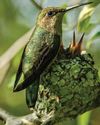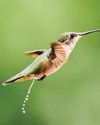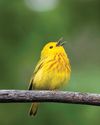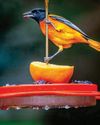
The birds in our gardens or local parks can feel like old friends after a while. It may seem as if we're seeing the same individuals year after; year-and that may be true because often they stay faithful to their home territory. But it can lead us to wonder: How long do these birds live? That question can be surprisingly hard to answer.
Cushy Cage Life
After a bird reaches its adult plumage, it's impossible to tell how old it is just by looking at it. But some zoos and aviaries keep records of individual birds, which means we can track their ages. One example: A pink cockatoo (a type of Australian parrot) arrived at the Brookfield Zoo near Chicago in 1934. When he died in 2016, he was at least 83 years old. It's also been claimed that some other parrots, especially large ones like cockatoos and macaws, have reached over 100 years old. Some probably have, but it's difficult to be sure without complete documentation.
Birds in good zoos, protected from predators and with access to veterinary care, may live longer than those in the wild. Aside from large parrots, some other zoo birds that have lived more than 60 years include flamingos and Andean condors.
Life in the Wild
This story is from the February/March 2024 edition of Birds & Blooms.
Start your 7-day Magzter GOLD free trial to access thousands of curated premium stories, and 9,000+ magazines and newspapers.
Already a subscriber ? Sign In
This story is from the February/March 2024 edition of Birds & Blooms.
Start your 7-day Magzter GOLD free trial to access thousands of curated premium stories, and 9,000+ magazines and newspapers.
Already a subscriber? Sign In

SUPER MOMS
Whether they are laid-back layers or helicopter moms, multiple parenting styles emerge among mothers in the bird kingdom.

IN FULL BLOOM
Talented readers share their snapshots of striking florals

The Science of Bird Poop
An expert breaks down the complex chemicals of bird waste BY EMILY HANNEMANN

Heralds of Spring
Snapshots of the energetic songbirds that captured readers' hearts

New Plants for 2025
Stunning fresh picks for your beds and containers BY WENDY HELFENBAUM

Converting to Clover
Learn the basics about this increasingly popular, pollinator-friendly lawn option

Ask the Experts
Readers get answers to puzzling bird and garden situations

Small Spaces, BIG FLAVOR
INCLUDE THESE COMPACT FOOTPRINT FRUIT PLANTS IN YOUR CONTAINER GARDENS AND MIXED BORDERS FOR A TASTY HARVEST

Basics of Hydroponics
Use these top tips and plant picks to have a successful soil-free garden

Rooted in Resilience
These hardy perennials will thrive in most zones
